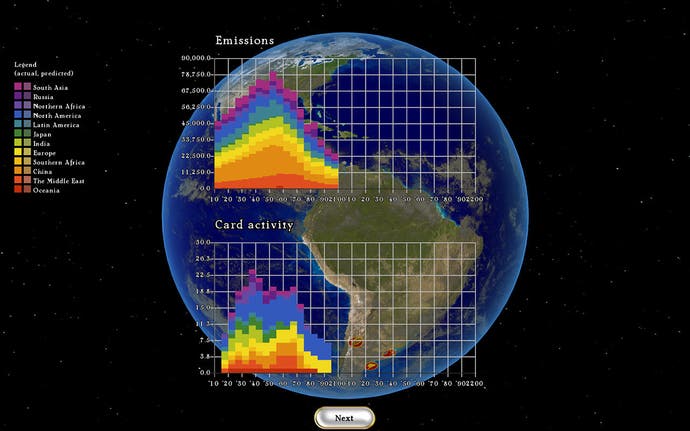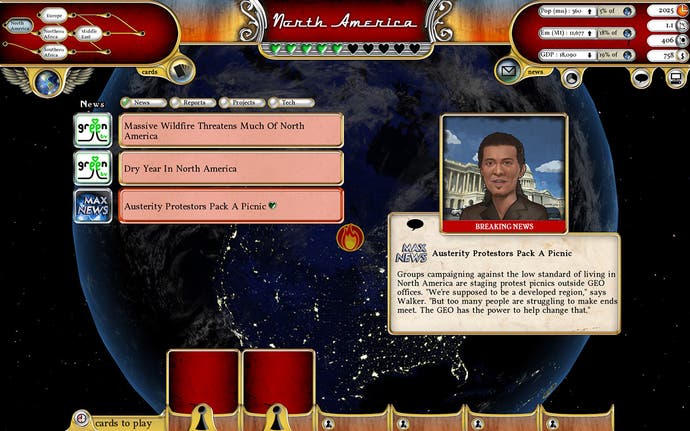Fate of the World
Ends of the Earth.
Foremost of these is a new campaign in between the reasonably forgiving first and the dramatically demanding second, which offers an alternate near-contemporary Earth in which climate change might be a pressing concern, but at least oil isn't horrifically scarce. It's still a hell of a lot to deal with, but the breather before dealing with a world in which absolutely everything is going to hell at high speed makes a significant difference, as do under-the-hood tweaks to the effects of mucking around with resources.
Make no mistake, though: this is an unforgiving game. While traditional strategy game thinking might get you so far, the key to mastering it really lies in research: of the extensive but awkward in-game Wiki (sadly just a long, clunky list of topics), of the oodles of graphs which demonstrate exactly what's going on in each territory, and of the sprawling but repeatedly revelatory fan Wiki. The developers seem well aware of the difficulty issues and have taken steps to adjust them, but it raises a particularly awkward dilemma for a reviewer. The game genuinely needs to be challenging to achieve what it's trying to achieve, but that it's something that either requires sucking up the punishment or doing a hell of a lot of reading first casts a shadow over it.
Personally, I lean towards admiring it for its vertical difficulty curve. It makes me take it that much more seriously, and it makes me read and think rather than bludgeon and slumber. Plus, there's a certain giddy thrill to seeing its chaos theory in catastrophic action, experiencing just how terrible things can get.

There's a twisted reward at the end of it all too, in the form of the final mission, Dr Apocalypse. Here, you're actively trying to trash the planet, but with the new complexity of trying to throw the world off the scent of your evil. With a raft of monstrous cards (gene warfare, book-burning, cheerily eating endangered species...) you wouldn't dare go anywhere near in the standard missions, it's almost a whole new game, a deliciously sadistic subterfuge that would likely support its own entire campaign. To be honest, it's a minor shame that later missions are locked until you've completed earlier ones – even though the gradual progression is necessary to get a handle on things, opening the game up from the start would perhaps make it a little less galling.
It's absolutely vital to observe, though, that Fate of the World is never anything less than compelling, despite a sometimes fussy interface that can struggle to prioritise the most important information. When something turns to crap, the urge is not to sullenly admit defeat but fight to fix it. When you lay down a card, you lay down your hopes and fears. When you pore over the graphs, you're a detective looking for clues to solve the world's biggest crime.

Most of all, when you take a deep breath and press the End Turn button, you await the list of consequences breathlessly. Are you a hero or a villain? Will war be over? Will Russia still be funding you? Will global temperatures have dodged that latest 1 degree rise, or will this be the turn that sees North America's last forests reduced to ashes, the few remaining rhinos breathing their last and Europe destroyed by drought and famine?
Probably. That's the point. You learn through tragedy. Perhaps Fate of the World isn't actually about figuring out how to save the world, or even about being a dark and smart strategy game. It's about getting behind the rhetoric and gaining a meaningful understanding of the many dreadful things we're doing to our home.
